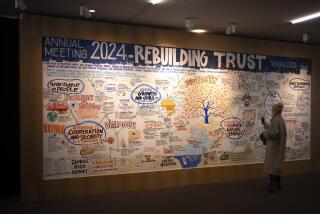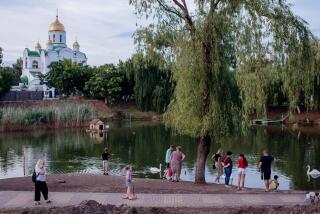Broken Promises Reach Across Russia’s Far East
- Share via
VLADIVOSTOK, Russia — At 6 p.m. the lights go out. Refrigerators clank to a stop, and residents of this port city begin to grumble about yet another evening of cooking dinner on portable camp stoves.
Periodic power outages, mounds of garbage on the streets and salaries that are months overdue are just a few signs of the decay and poverty that have gripped Vladivostok, the largest city in Russia’s Far East.
When Russia began free-market reforms after the Soviet collapse in 1991, Vladivostok, a previously closed military port, had every reason to believe it would be one of the leading beneficiaries.
A richly endowed thumb of land on the southernmost reaches of Russia’s Pacific Coast, the Vladivostok region is nestled among some of the world’s most dynamic economies--Japan to the east, China to the west and South Korea to the south.
Foreign investors wasted no time setting down roots as Vladivostok opened to the world, seeking to take advantage of the region’s ports, coal mines and forests.
But five years later there are only hints of economic revival in Vladivostok, a hilly city of 800,000 people. A sprinkling of new shops offer imported goods. Cranes swing used Japanese cars off ships. Churches are being built for the first time in 70 years.
More glaring are the problems: impassable potholes scar streets; rusting ships list in the bay; diapers, newspapers and plastic bags swirl around suburban streets, a result of a strike by garbage collectors who have not been paid.
In late March, 10,000 protesters marched on the the city’s main square to vent their frustration with regional officials and the central government in Moscow, thousands of miles and seven time zones to the west.
But when city council elections were held three days later, only 10% of the electorate voted, not enough to make the poll valid. A previous attempt in December also failed to produce a result because of low voter turnout.
Pavel Kovalyov, a 30-year-old specialist in the acupuncture center at the Primorye Regional Hospital, hasn’t been paid in months.
“Everyone has their own way of surviving,” Kovalyov said. “My mother lives in the country, and she has a large stock of food. I’ve been living off that, but I have been very near giving it all up and doing something where I can get paid.”
The average monthly wage in the region is about 1.1 million rubles, about $200. And many items, including food, cost roughly the same as they do in the United States.
Outlying towns look as if time has passed them by. In the village of Primorsky, a four-hour drive from Vladivostok, most people live off the land in tiny, leaning dachas constructed of odds and ends of plywood. Plumbing is usually outdoors.
At one school, children were eating their lunch standing up because the school couldn’t afford enough chairs.
Nadezhda Akhonina, a seventh-grade geography teacher, now earns much of her income selling vegetables on the roadside in Siny Gai, 100 miles northeast of Vladivostok.
She estimates she earned the equivalent of $1,250 during the two months she worked as a roadside vendor last summer. She makes only $125 a month as a teacher--when she gets paid: She finally got her October pay in March.
“It’s the highway that feeds us in the times we don’t get paid,” said Akhonina, 53.
While the markets now offer consumer goods that weren’t available in Soviet times, there are few signs that a sustainable economy is developing.
“Nobody is investing in industry now. Everybody wants to buy something abroad and sell it here--Korean paints and Choco-Pies,” said Yury Boyko, a local executive and member of Vladivostok’s Economic Planning Council. “Everybody is learning how to buy, but not how to build.”
Ambitious plans for an American-style supermarket in Vladivostok fizzled last year, when the project went broke. Foreign investment has been limited to a few big-league companies, such as Coca-Cola, Pepsi and South Korea’s Hyundai, and even they have faced countless problems. All face a formidable web of obstacles: crime, bureaucracy and chronic energy shortages.
The latest energy crunch hit in mid-March, when the regional power company, Dalenergo, announced it couldn’t afford to heat apartments in some cities.
The temperatures inside apartments in the town of Nakhodka dropped as low as 41 degrees, and lights went off for several hours at a time in many Vladivostok apartments.
For a solution, regional Gov. Yevgeny Nazdratenko is looking to the past and calling for federal subsidies.
“We should go back to our cursed old practices, no matter how we might criticize them,” he said.
More to Read
Sign up for Essential California
The most important California stories and recommendations in your inbox every morning.
You may occasionally receive promotional content from the Los Angeles Times.










